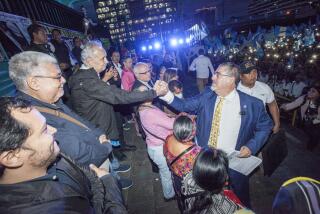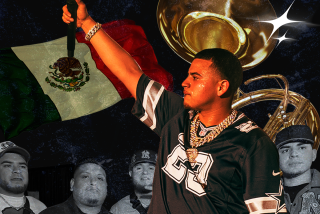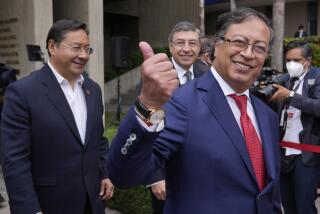Noriega Foes Struggle to Mount Protest Strike : Shutdown Urged Today Amid Fears of Reprisals; Delvalle Still in Hiding, Vows to Stay in Panama
PANAMA CITY — Timidly and in fear of reprisals, opponents of Panamanian military strongman Manuel A. Noriega made preparations Sunday to mount a general strike today, while the country’s deposed civilian president remained in hiding and vowed to stay in Panama.
Moves to get ready for the strike were painstaking. Because Gen. Noriega’s regime has shuttered opposition newspapers and radio and television stations, organizers depended on a small army of women to make telephone calls throughout the day to persuade merchants and industrialists to shut their businesses.
Logistics, however, were only part of the problem. Fears tended to erode the willingness of protesters to display opposition to Noriega.
“People are afraid. It is a problem that they think is a problem--they think that death could come at any moment,” said Roberto Brenes, a leader of the Civic Crusade, a group made up of about 200 business and trade organizations that have spearheaded the opposition to Noriega.
Crusade leaders say they must make an impact with the general strike or face embarrassment not only inside Panama but abroad. “We have to show that Panamanians are solidly against the government,” Brenes said.
The government indirectly cautioned against the strike by publishing stories in its own newspapers asserting that “the gringos” have ordered the work stoppage.
Noriega’s opponents were clearly nervous. A small impromptu rally at a Roman Catholic Church on Sunday broke up in panic when word spread that police were coming. No police showed up.
The Civic Crusade has been trying to overthrow Noriega’s military rule since last June. The resulting turbulence has not only created immense local political tensions and severe economic problems but has also seriously taxed relations between Panama and the United States.
The Panama Canal is considered a major economic lifeline in this hemisphere, and the United States, bound by the Panama Canal treaties to defend the vital waterway until Dec. 31, 1999, maintains several military bases along its banks.
The continuing political crisis suddenly deepened last week when President Eric A. Delvalle, who had never previously functioned as much more than a civilian figurehead in Noriega’s shadow, tried to fire the strongman as commander of the nation’s Defense Forces. The National Assembly promptly ousted Delvalle, replacing him as president with Education Minister Manuel Solis Palma.
Delvalle, who sneaked out of his guarded home and went into hiding Saturday just ahead of a move by the military to send him into exile, later telephoned ABC News from his hide-out to proclaim:
“I am going to stay here. I’m going to stick it out. I’m going to fight all the way.”
A Rallying Point
Delvalle’s defiance has become a rallying point for the Civic Crusade, even though he and the crusade were long at odds, because while he held office, Delvalle acted as a front for Noriega’s rule.
The deposed leader’s whereabouts remained a mystery Sunday. Panamanian exiles in Washington insisted that he was safe and that he had not taken refuge with any foreign embassy in Panama, as has been widely rumored here.
His location has taken on symbolic value: if Delvalle remains in Panama, he continues to be a central figure in efforts to unseat Noriega; if he has taken refuge with a foreign government, he is technically out of Panama and his claim to still be the nation’s civilian president would correspondingly suffer.
‘Under Protection’
“Delvalle is under the protection of good Panamanians,” insisted Gabriel Lewis, a former Panamanian ambassador to Washington who has been the opposition’s point man in dealings with the Reagan Administration.
In a telephone interview from Washington, Lewis emphasized the opposition’s hope that foreign governments will recognize Delvalle and not Solis as Panama’s legitimate president.
“It is critical that the international community rally around him,” Lewis said.
The Reagan Administration continues to recognize Delvalle as Panama’s chief of state.
Noriega’s government has said little about Delvalle’s move underground. Mario Rognoni, a spokesman for Noriega in the United States, told the NBC television program “Meet The Press” that Delvalle is free to return to his neighborhood.
‘A Free Citizen’
“He has committed no crime and is a free citizen. He was never under arrest and there is no judicial action against him,” Rognoni said. “He can go back to his house and his private business.”
Members of Delvalle’s family in Panama City were unconvinced. They gathered at the ousted president’s four-bedroom house here to divide up his valuable belongings and put them into safekeeping.
Workmen carried paintings out of the home while women packed vases and plates for loading into private cars. Down the street, soldiers kept a watch on the proceedings.
“We believe that someone might be sent to destroy the house,” said Raul Diaz, a brother-in-law of Delvalle.
According to Diaz, Delvalle’s wife has taken refuge in a foreign embassy in Panama City. She told him by telephone that her husband intends to stay in Panama and not flee the country.
‘Looking for Support’
“President Delvalle’s looking for support from other countries for his presidency,” Diaz said.
Delvalle’s dismissal forced the Civic Crusade to advance the date of a strike that it had already planned for the middle of March.
“Once Delvalle was out, we knew we had to act,” Warland de Janon, a crusade official, said.
Brenes and De Janon predicted that nearly all private industry and construction businesses will shut down today. However, they were less confident that retail stores would close.
In addition, international banks, a backbone of the Panamanian economy, declined to join the strike, Brenes said. There were rumors of a sudden withdrawal of deposits from both local and foreign banks, but that could not be confirmed.
No Street Protests Planned
The crusade has no plans to mount street demonstrations. Anti-Noriega protesters have not marched in Panama City since last fall. In October, the government sent 5,000 soldiers into the streets to discourage a scheduled rally in the capital.
A brief rally Sunday at the Cristo Rey Church featured a short speech by another crusade official, Aurelio Barria, who appealed for international support.
“We ask the world to observe that our safety and sacrifice depends on their actions,” he said.
Suddenly, a voice in the crowd warned, “The guard is coming!” Panama’s Defense Forces, the nation’s sole military and police organization, was called the National Guard until 1983.
The crowd of about 100 fled quickly.
Neither Noriega nor Solis appeared in public Sunday.
Speech Published
The government-owned newspaper La Republica published a speech Noriega made Saturday in which he expressed support for “the new president.” Noriega also promised that U.S. citizens in Panama can “walk our streets without danger.”
Articles in La Republica suggested that the crusade’s strike call was aimed at inviting a U.S. military invasion.
Jose Didimo, head of a government-affiliated students organization, declared: “The strike that unpatriotic sectors hope to carry out constitutes a desperate try to strangle the country economically, create chaos, as well as create conditions for open intervention by American forces in Panama.”
The United States has about 10,000 troops stationed in Panama bases, and there are about 13,000 of their dependents here.
More to Read
Sign up for Essential California
The most important California stories and recommendations in your inbox every morning.
You may occasionally receive promotional content from the Los Angeles Times.










